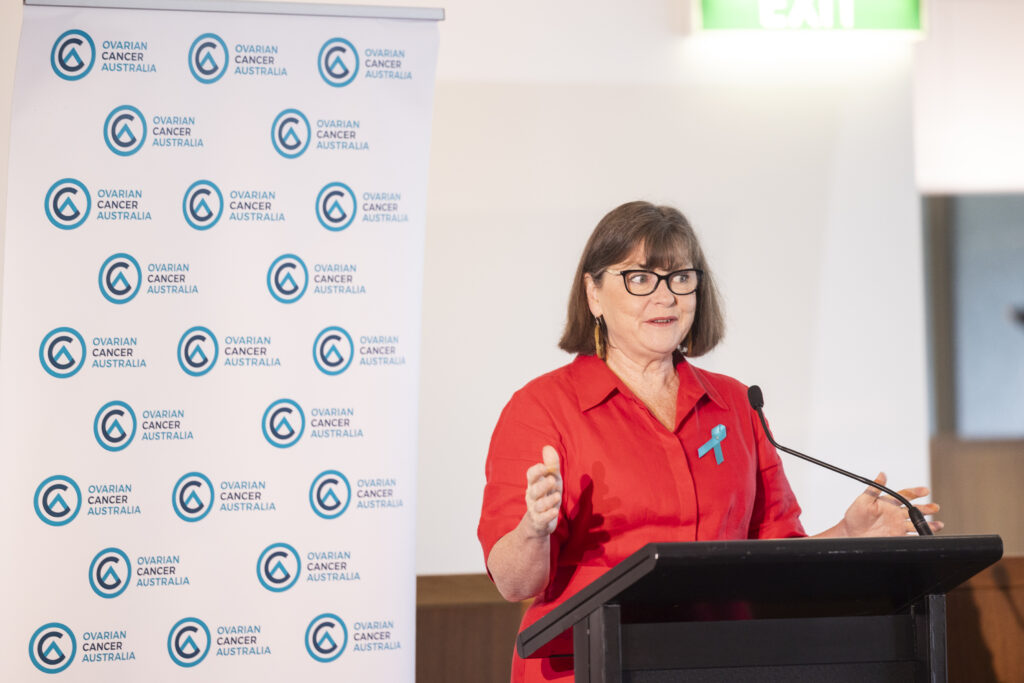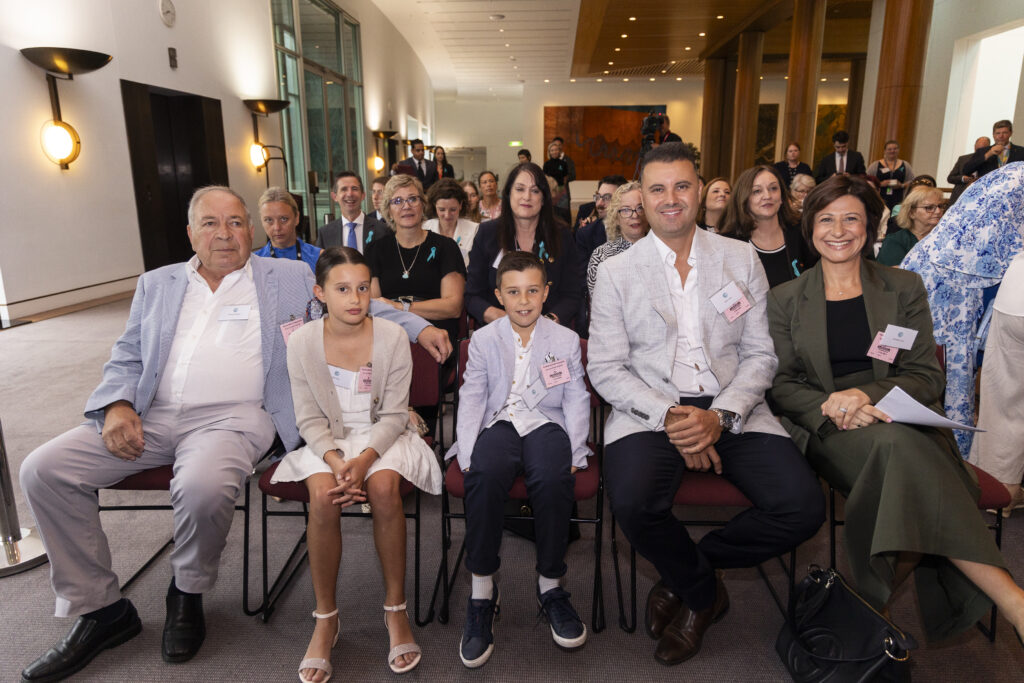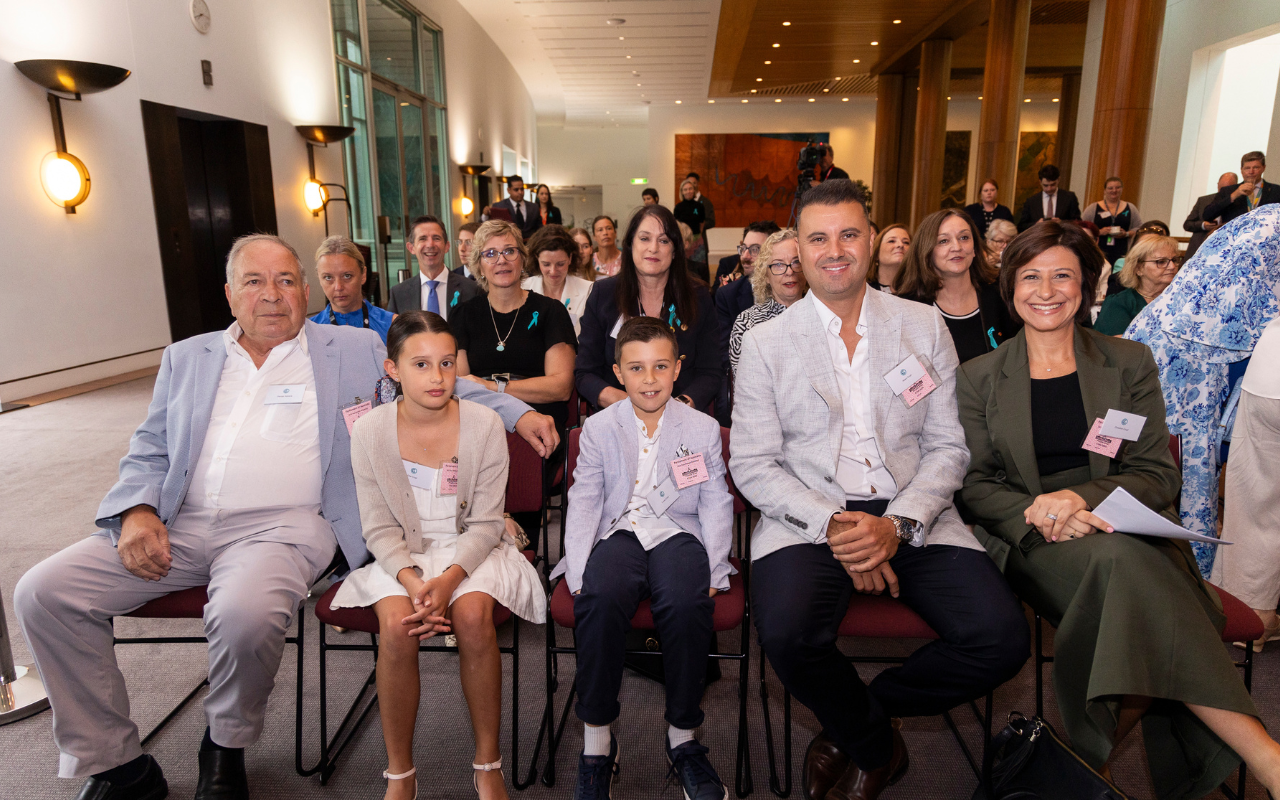Women with ovarian cancer have been “let down” by institutional and medical biases, the Assistant Health Minister said, as Parliamentarians, advocates and patients gathered for the Teal Ribbon Parliamentary Breakfast in Canberra recently.
Christine Crupi was aware of her cancer risk. Her mother had died of breast cancer when she was 48, so Christine was vigilant with annual breast magnetic resonance imaging scans, mammograms and ultrasounds.
However, in 2022, she was diagnosed with the “wrong cancer”: ovarian cancer.
“The cancer I couldn’t do annual screening tests for, the cancer for which I was not well versed on the symptoms and the cancer with the less promising prognosis,” she said.
“Not once had anyone discussed the possibility of ovarian cancer or the linkage between ovarian and breast cancer. It just simply was not part of the dialogue.”
Christine was the keynote speaker at the 2024 Teal Ribbon Parliamentary Breakfast at Parliament House in Canberra on 6 February 2024, for Ovarian Cancer Awareness Month.
She spoke about the shock of her diagnosis and the intensity of her treatment, which included a radical hysterectomy and debulking surgery followed by chemotherapy.
She also recalled the anxiety of waiting to find out whether she would be able to access the poly (ADP-ribose) polymerase (PARP) inhibitor olaparib, which has been newly listed on the Pharmaceutical Benefits Scheme.
“I was one of the lucky ones having obtained access to olaparib on compassionate grounds due to my rarer RAD51C gene mutation rather than the more common BRCA mutation,” she said.
“I can’t tell you the anxiety that came as I waited for news as to whether I’d be granted access to this drug. I remember how it made me sick to my stomach to think that such treatment was available yet not accessible to a vast number of women who could benefit from it. Women will no longer have to self-fund or miss out on treatment.”

Ovarian cancer in Australia
Despite this recent life-changing announcement, ovarian cancer remains a silent killer, with around 1815 women diagnosed each year in Australia. In many cases, it’s diagnosed in later stages, which is much more difficult to treat. It remains the sixth most common cause of death from cancer among women.
One of the problems is that the symptoms are vague so women often dismiss them, as Christine herself did to begin with.
“My symptoms, many of which were the type of symptoms that could easily be rationalised as typical female aches and pains,” she said. “Whilst these symptoms were persistent, they were not causing a significant disruption to my day and they were easy to ignore.”
Fellow speaker at the breakfast, Assistant Minister for Health and Aged Care, the Hon Ged Kearney MP, said women have been let down by ingrained institutional and medical biases.
“For far too long, medicines were designed for men, mostly by men and for conditions that affect men,” she said.
“Treatments have been retrofitted for women’s lives with dire or less than effective outcomes.
“Research dollars have largely flowed one way and women have been told to suck it up. You have pain, that’s a woman’s lot, it’s the burden of our gender, we just put up with it.”

National Women’s Health Strategy
However, there is hope that this will change. The National Women’s Health Strategy, published by the Department of Health, examines the unique health challenges facing women including delayed diagnosis, overmedicating, dismissal of pain or other symptoms, and a lack of research and evidence used to treat women. One of the priorities is to support research into low survival gynaecological cancers, such as ovarian cancer.
Ovarian Cancer Australia has identified seven key opportunities to align with the Women’s Health Strategy as outlined at the Senate Inquiry into Equitable Access to Diagnosis and Treatment for Individuals with Rare and Less Common Cancers. They are:
- Supporting investment in priority populations within less common cancers whose outcomes are poorest and providing culturally safe care.
- Using health intelligence to address known variation in care and inequity.
- Greater investment in research, prioritising the early detection and treatment resistance.
- Ensuring all people have access to genetic testing and molecular profiling to support diagnosis, treatment planning and risk management.
- Systems to support the role of genomics, ensuring Australians know their risk and can access the best treatments and technologies and participate fully in clinical trials matching.
- Care guided by centres of excellence, delivered as close to home as safely possible.
- Reducing the time to listing for novel tests and therapies to reduce the need for self-funding.
CEO of Ovarian Cancer Australia, Associate Professor Anna Boltong, told the Senate Inquiry: “The good news is that we don’t start with a blank page. Efforts have been made to identify opportunities to level the playing field.”
Teal nurse support
One key area of progress has been the establishment of the Teal Support Program in 2019. Since its inception, over 1100 women have received personalised support from a Teal Support nurse.
Christine spoke about the importance of her Teal Support nurse, Rosetta.
“She was a wonderful listener and also had a wealth of knowledge, which I just found invaluable,” she said.
“She provided personalised guidance with the management of side effects from chemo[therapy] and she offered advice on other support services that were available. But most importantly, she gave me hope.”
“I cannot stress how valuable the Teal Support Program has been to me throughout my journey. These nurses are not just any nurses. Their specialised knowledge and compassion set them apart and they make all the difference to a woman living with ovarian cancer.”

In addition to the Teal Support Program, two years ago, Ovarian Cancer Australia established a dedicated psychosocial services team. Associate Professor Boltong explained at the breakfast that this service addresses the additional complex challenges faced by women with ovarian cancer such as anxiety, depression, financial concerns, body image and the fear of death and dying.
“This service helps women continue to function at work and care for their families,” she said.
“This service does not have ongoing funding. Our objective is to make a difference to those with the poorest outcomes dedicated to ensuring that individuals feel supported at every step. Walking forward and never alone.”
These services continue to be vital for Christine. Although her positron emission tomography (PET) scans show she’s free of cancer, she continues to live with the physical and mental scars of her diagnosis.
“Life is simply not how I previously knew it,” she said. “Having to now manage the side effects of ongoing maintenance therapy, surgically induced menopause, osteoporosis and, of course, learning to live with the ongoing fear of disease reoccurrence. The reality is that women living with ovarian cancer have ongoing needs and those needs are diverse. On the surface, it may not be obvious that these needs exist, but I can assure you they are prevalent …
“The psychosocial support services Ovarian Cancer Australia offers is vital to women on this journey striving to find a way to live with the cards they’ve been dealt.”
Ongoing support is needed
Despite the advancements in the sector, Chair of Ovarian Australia and ovarian cancer survivor, Meghan Speers, explained that much more needs to be done.
“Our commitment extends beyond treatment alone,” she said. “We aspire to deliver equitable and optimal care across the entire cancer continuum.
“It is in our collective strength, determination and, importantly, our hope that we find the power to make a difference.”
Subscribe to the free InSight+ weekly newsletter here. It is available to all readers, not just registered medical practitioners.

 more_vert
more_vert